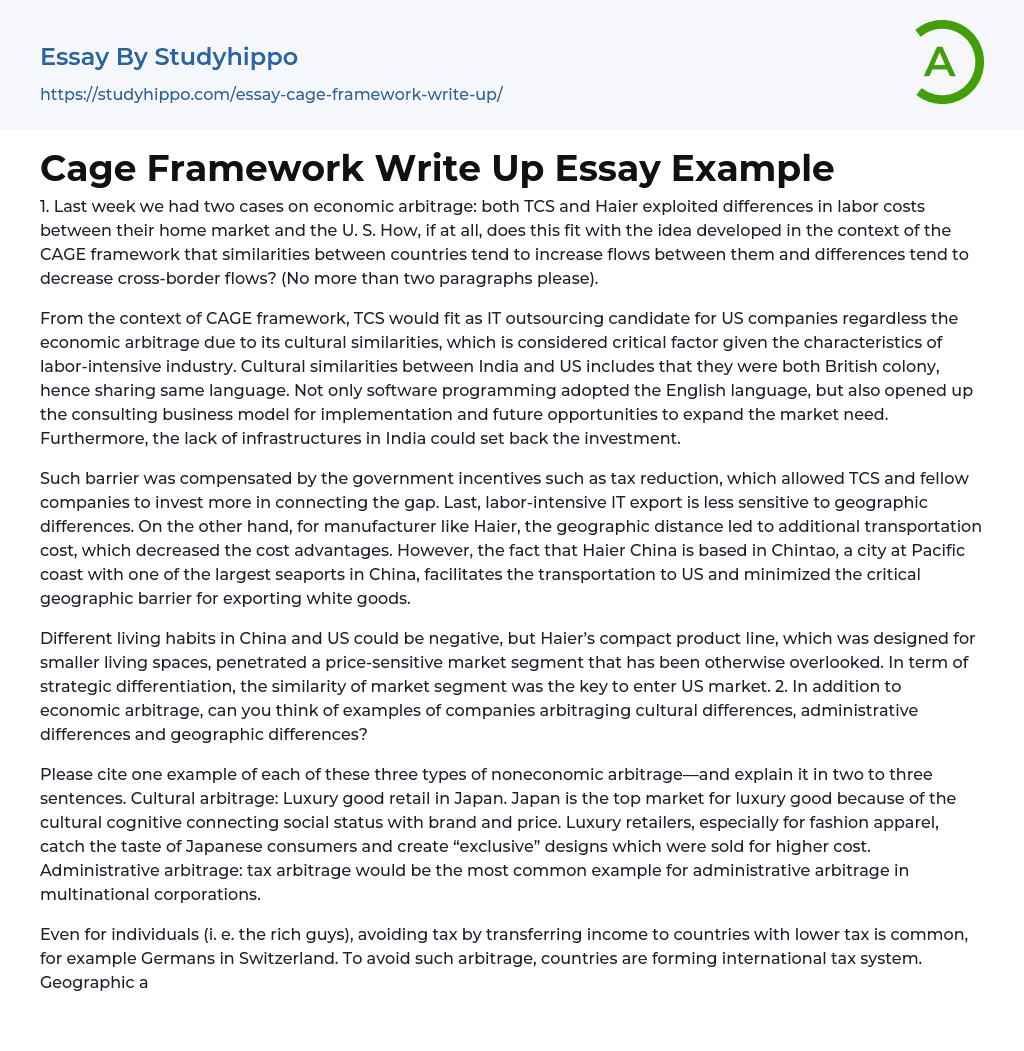1. Last week we had two cases on economic arbitrage: both TCS and Haier exploited differences in labor costs between their home market and the U. S. How, if at all, does this fit with the idea developed in the context of the CAGE framework that similarities between countries tend to increase flows between them and differences tend to decrease cross-border flows? (No more than two paragraphs please).
From the context of CAGE framework, TCS would fit as IT outsourcing candidate for US companies regardless the economic arbitrage due to its cultural similarities, which is considered critical factor given the characteristics of labor-intensive industry. Cultural similarities between India and US includes that they were both British colony, hence sharing same language. Not only software programming adopted the English language, but also opened up the consulting business model for implementation and future
...opportunities to expand the market need. Furthermore, the lack of infrastructures in India could set back the investment.
Such barrier was compensated by the government incentives such as tax reduction, which allowed TCS and fellow companies to invest more in connecting the gap. Last, labor-intensive IT export is less sensitive to geographic differences. On the other hand, for manufacturer like Haier, the geographic distance led to additional transportation cost, which decreased the cost advantages. However, the fact that Haier China is based in Chintao, a city at Pacific coast with one of the largest seaports in China, facilitates the transportation to US and minimized the critical geographic barrier for exporting white goods.
Different living habits in China and US could be negative, but Haier’s compact product line, which was designed for smaller living spaces, penetrated a price-sensitive
market segment that has been otherwise overlooked. In term of strategic differentiation, the similarity of market segment was the key to enter US market. 2. In addition to economic arbitrage, can you think of examples of companies arbitraging cultural differences, administrative differences and geographic differences?
Please cite one example of each of these three types of noneconomic arbitrage—and explain it in two to three sentences. Cultural arbitrage: Luxury good retail in Japan. Japan is the top market for luxury good because of the cultural cognitive connecting social status with brand and price. Luxury retailers, especially for fashion apparel, catch the taste of Japanese consumers and create “exclusive” designs which were sold for higher cost. Administrative arbitrage: tax arbitrage would be the most common example for administrative arbitrage in multinational corporations.
Even for individuals (i. e. the rich guys), avoiding tax by transferring income to countries with lower tax is common, for example Germans in Switzerland. To avoid such arbitrage, countries are forming international tax system. Geographic arbitrage: companies harvesting natural resources such as oil, gas, and minerals. For countries that lack of natural resources would create enormous demand for those who exports. Furthermore, the model expands to the processing industry as well, for example, steel processing.
- Population essays
- Cultural Assimilation essays
- Demography essays
- Ethnographic essays
- Population Growth essays
- Asset essays
- Depreciation essays
- Discounted Cash Flow essays
- Foreign Direct Investment essays
- Funds essays
- Internal Rate Of Return essays
- Revenue essays
- Day Trading essays
- Futures Trading essays
- Capital market essays
- Million essays
- Payment essays
- Rate Of Return essays
- Funding essays
- Hedge Fund essays
- Advertising essays
- Audience Theory essays
- Competitor Analysis essays
- Consumer essays
- Marketing Management essays
- Marketing Mix essays
- Marketing Plan essays
- Marketing Research essays
- Marketing Strategy essays
- Point Of Sale essays
- Price essays
- Procurement essays
- Product essays
- Product Differentiation essays
- Promotion essays
- Promotion And Marketing Communications essays
- Retailing essays
- Trademark essays
- Anheuser-busch essays
- Brands essays
- Detergent essays
- Product Placement essays
- Research Design essays
- New Product Development essays
- Advertisement essays
- Brand essays
- Sales Promotion essays
- Advertising campaign essays
- Consumer behaviour essays
- Offer And Acceptance essays




